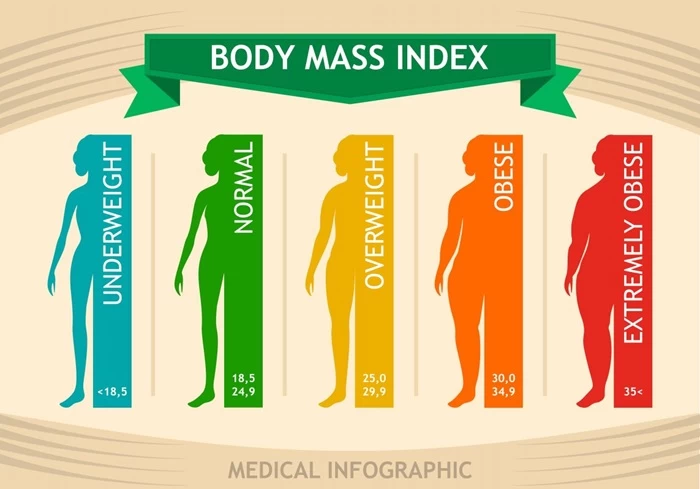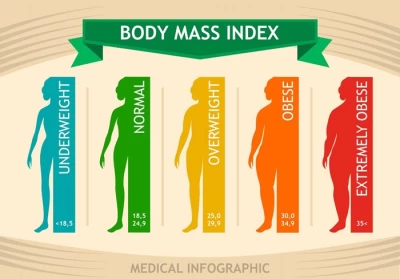Navigating Health through BMI Insights
Learn how to calculate and interpret the Body Mass Index (BMI) for a deeper understanding of your body's composition.

Body Mass Index (BMI) is a numerical measure that assesses an individual's body weight in relation to their height. It is commonly used to categorize a person's body composition and estimate whether their weight falls within a healthy range. BMI is figured out by taking a person's and dividing it by the square of their height. The resulting value is then interpreted using standard BMI categories, such as underweight, average weight, overweight, and obesity. While BMI is a convenient and widely utilized tool for assessing body weight, it does not directly measure body fat. It may not account for variations in muscle mass or distribution. Therefore, it is essential to interpret BMI results cautiously and consider additional factors when evaluating an individual's overall health. Consulting with healthcare professionals can provide a more comprehensive understanding of an individual's health status.
How to calculate your BMI?
- Enter Your Weight: Use a scale to measure your weight in kilograms pounds.
- Enter Your Height: Use a tape measure or a stadiometer to measure your height in feet or inches. If you only have your height in meters, you can convert it to the respective scale.
- Calculate Your BMI: Calculate your BMI by clicking the "Calculate" button.
The benefits of using an online BMI calculator
Convenient and accessible
Using online BMI calculator can offer several advantages for individuals seeking to assess their body mass index. Firstly, these calculators provide a quick and accessible means of determining BMI, requiring only basic information such as height and weight. A User-friendly interface makes it convenient for people to regularly monitor their BMI without the need for complex measurements or calculations.
Instant Results and Feedback
Additionally, online BMI calculators often offer instant results, allowing individuals to understand their current BMI status promptly. This immediate feedback can serve as a valuable tool for those aiming to maintain a healthy weight or embark on a fitness journey. Furthermore, the ease of access to online BMI calculators promotes regular monitoring, empowering users to track changes in their BMI over time and make informed decisions regarding their health.
Educational Value and Information
Moreover, these calculators often accompany additional information, such as BMI categories and corresponding health implications. This educational component contributes to a better understanding of how BMI relates to overall health and encourages individuals to make informed lifestyle choices. By providing a user-friendly, efficient, and informative experience, online BMI calculators contribute to the promotion of health consciousness and proactive wellness management.
Limitations of online BMI calculator
- Accuracy may vary: Online BMI calculators provide a general estimation based on height and weight, but they don't consider factors like muscle mass or distribution. Therefore, the calculated BMI may not accurately reflect an individual's body fat percentage or overall health.
- No personalized context: BMI calculators don't account for variations in body composition, such as the distribution of fat and muscle. Individuals with the same BMI can have different body compositions, leading to other health implications.
- Doesn't assess overall health: BMI calculators solely focus on body weight in relation to height and need to take into account other crucial health factors such as diet, physical activity, genetics, and medical history. Therefore, they provide a limited perspective on overall health.
- Not suitable for specific populations: BMI calculators may not be ideal for athletes or those with a high muscle mass, as muscle, weighs more than fat. Consequently, individuals with a significant amount of muscle may be categorized as overweight or obese despite being in good health.
- Lack of age consideration: BMI calculators often need to consider age-related changes in body composition. For instance, older adults may experience muscle loss, impacting the accuracy of BMI as an indicator of health.
- Not a diagnostic tool: BMI calculators are not diagnostic tools and should not be used as the sole basis for determining an individual's health status. They provide a rough estimate and should be interpreted cautiously.
- Potential for misinterpretation: People may misinterpret BMI categories, leading to unnecessary concern or complacency about their health.
How to interpret your BMI results:
- Underweight: If your BMI is below 18.5, it suggests that you may be underweight. This could be due to insufficient nutrition or other health concerns.
- Average weight: A BMI between 18.5 and 24.9 is considered as ideal BMI range. This range indicates that your weight is generally healthy for your height.
- Overweight: If your BMI falls between 25 and 29.9, it suggests that you may be overweight. This could lead to health issues, and it's advisable to consider lifestyle changes.
- Obese: A BMI of 30 or higher indicates obesity. This increases the risk of various health problems. It's essential to consult with a healthcare professional for guidance on weight management.
Tips for maintaining a healthy weight
- Eat Balanced Meals: Eat a variety of foods from all the food groups. Include vegetables, Fruits, whole grains, lean proteins, and low-fat dairy in your meals.
- Watch Portion Sizes: Pay attention to how much you eat. Use smaller plates to control portions.Only eat a little at one time. Stop when you feel satisfied, not overly full.
- Limit Sugary Drinks and Snacks: Choose water, unsweetened tea, or other low-calorie drinks. Snack on fruits, vegetables, or nuts instead of sugary snacks.
- Be Active Every Day: Find activities you enjoy, like walking, dancing, or playing sports. Aim for at least 30 minutes of moderate exercise most days of the week.
- Get Enough Sleep: Strive for 7-9 hours of sleep per night. Insufficient sleep can influence your hunger hormones, potentially causing overeating.
- Drink Water: Drink plenty of water throughout the day. It helps with digestion and can help control hunger. If you want to see other calculators, you can visit CoolCalculator.

Body Mass Index (BMI) is a numerical measure that assesses an individual's body weight in relation to their height. It is commonly used to categorize a person's body composition and estimate whether their weight falls within a healthy range. BMI is figured out by taking a person's and dividing it by the square of their height. The resulting value is then interpreted using standard BMI categories, such as underweight, average weight, overweight, and obesity. While BMI is a convenient and widely utilized tool for assessing body weight, it does not directly measure body fat. It may not account for variations in muscle mass or distribution. Therefore, it is essential to interpret BMI results cautiously and consider additional factors when evaluating an individual's overall health. Consulting with healthcare professionals can provide a more comprehensive understanding of an individual's health status.
How to calculate your BMI?
- Enter Your Weight: Use a scale to measure your weight in kilograms pounds.
- Enter Your Height: Use a tape measure or a stadiometer to measure your height in feet or inches. If you only have your height in meters, you can convert it to the respective scale.
- Calculate Your BMI: Calculate your BMI by clicking the "Calculate" button.
The benefits of using an online BMI calculator
Convenient and accessible
Using online BMI calculator can offer several advantages for individuals seeking to assess their body mass index. Firstly, these calculators provide a quick and accessible means of determining BMI, requiring only basic information such as height and weight. A User-friendly interface makes it convenient for people to regularly monitor their BMI without the need for complex measurements or calculations.
Instant Results and Feedback
Additionally, online BMI calculators often offer instant results, allowing individuals to understand their current BMI status promptly. This immediate feedback can serve as a valuable tool for those aiming to maintain a healthy weight or embark on a fitness journey. Furthermore, the ease of access to online BMI calculators promotes regular monitoring, empowering users to track changes in their BMI over time and make informed decisions regarding their health.
Educational Value and Information
Moreover, these calculators often accompany additional information, such as BMI categories and corresponding health implications. This educational component contributes to a better understanding of how BMI relates to overall health and encourages individuals to make informed lifestyle choices. By providing a user-friendly, efficient, and informative experience, online BMI calculators contribute to the promotion of health consciousness and proactive wellness management.
Limitations of online BMI calculator
- Accuracy may vary: Online BMI calculators provide a general estimation based on height and weight, but they don't consider factors like muscle mass or distribution. Therefore, the calculated BMI may not accurately reflect an individual's body fat percentage or overall health.
- No personalized context: BMI calculators don't account for variations in body composition, such as the distribution of fat and muscle. Individuals with the same BMI can have different body compositions, leading to other health implications.
- Doesn't assess overall health: BMI calculators solely focus on body weight in relation to height and need to take into account other crucial health factors such as diet, physical activity, genetics, and medical history. Therefore, they provide a limited perspective on overall health.
- Not suitable for specific populations: BMI calculators may not be ideal for athletes or those with a high muscle mass, as muscle, weighs more than fat. Consequently, individuals with a significant amount of muscle may be categorized as overweight or obese despite being in good health.
- Lack of age consideration: BMI calculators often need to consider age-related changes in body composition. For instance, older adults may experience muscle loss, impacting the accuracy of BMI as an indicator of health.
- Not a diagnostic tool: BMI calculators are not diagnostic tools and should not be used as the sole basis for determining an individual's health status. They provide a rough estimate and should be interpreted cautiously.
- Potential for misinterpretation: People may misinterpret BMI categories, leading to unnecessary concern or complacency about their health.
How to interpret your BMI results:
- Underweight: If your BMI is below 18.5, it suggests that you may be underweight. This could be due to insufficient nutrition or other health concerns.
- Average weight: A BMI between 18.5 and 24.9 is considered as ideal BMI range. This range indicates that your weight is generally healthy for your height.
- Overweight: If your BMI falls between 25 and 29.9, it suggests that you may be overweight. This could lead to health issues, and it's advisable to consider lifestyle changes.
- Obese: A BMI of 30 or higher indicates obesity. This increases the risk of various health problems. It's essential to consult with a healthcare professional for guidance on weight management.
Tips for maintaining a healthy weight
- Eat Balanced Meals: Eat a variety of foods from all the food groups. Include vegetables, Fruits, whole grains, lean proteins, and low-fat dairy in your meals.
- Watch Portion Sizes: Pay attention to how much you eat. Use smaller plates to control portions.Only eat a little at one time. Stop when you feel satisfied, not overly full.
- Limit Sugary Drinks and Snacks: Choose water, unsweetened tea, or other low-calorie drinks. Snack on fruits, vegetables, or nuts instead of sugary snacks.
- Be Active Every Day: Find activities you enjoy, like walking, dancing, or playing sports. Aim for at least 30 minutes of moderate exercise most days of the week.
- Get Enough Sleep: Strive for 7-9 hours of sleep per night. Insufficient sleep can influence your hunger hormones, potentially causing overeating.
- Drink Water: Drink plenty of water throughout the day. It helps with digestion and can help control hunger. If you want to see other calculators, you can visit CoolCalculator.
Conversation
Latest Blogs
© Blog CoolCalculator, Explore CoolCalculator, your destination for the latest insights, tips, and updates on the world of online calculators. Stay informed and make your calculations smarter with our blog. ,
Designed
by Saad Media Team , Team Lead M.Rizwan Akhtar












